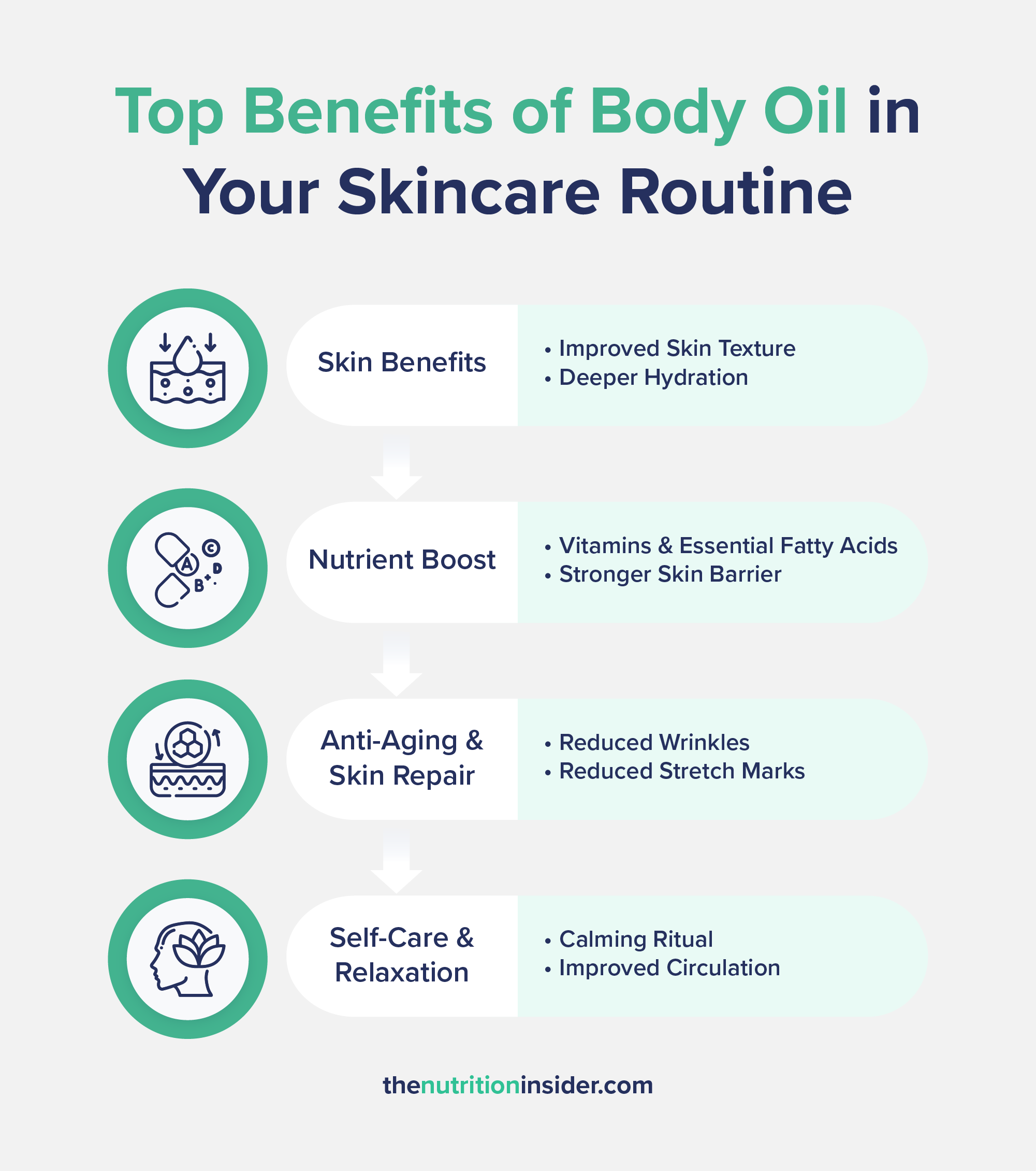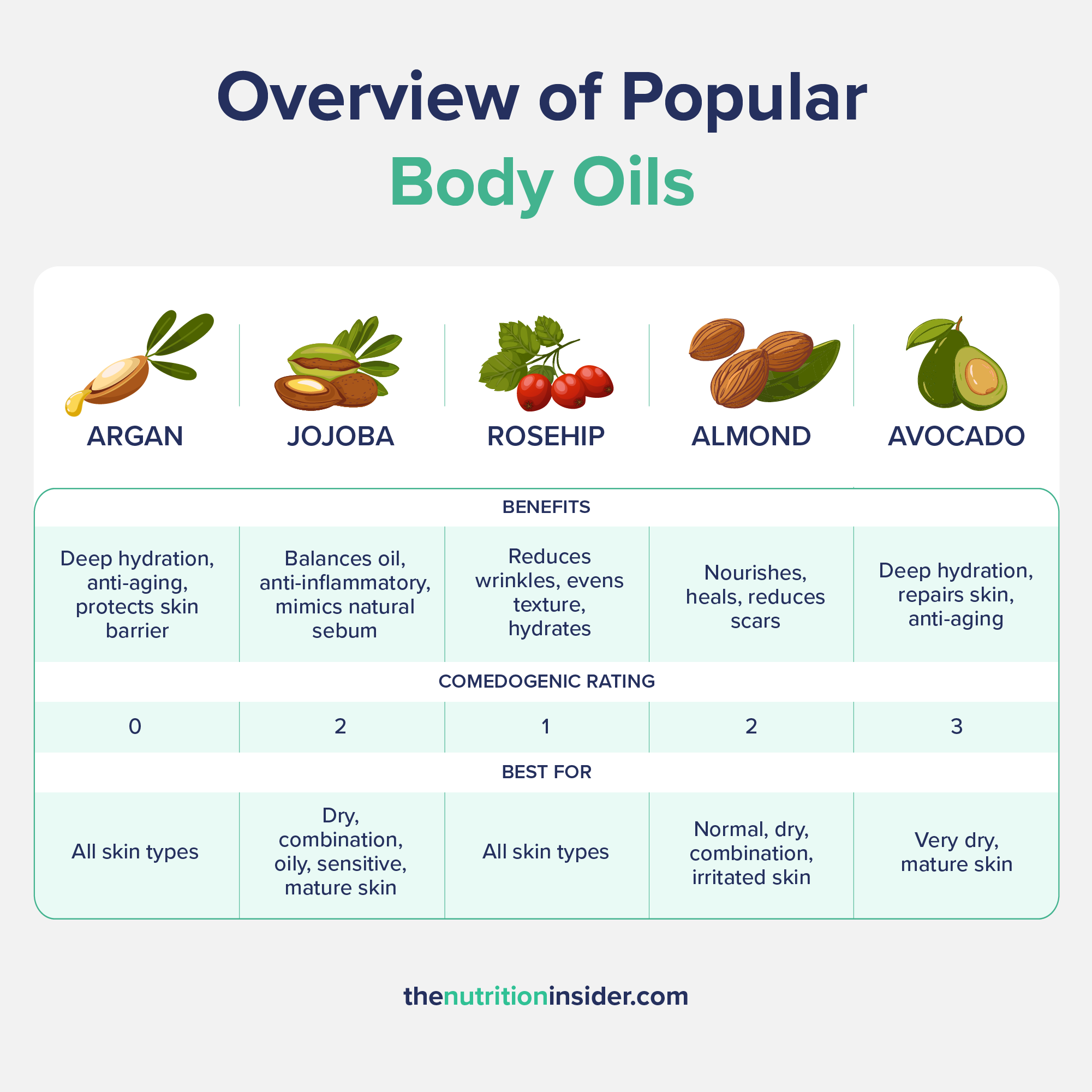Save $40 on your initial consult with a TNI Dietitian!
Talk to a real Dietitian for only $99: Schedule Now
This post contains links through which we may earn a small commission should you make a purchase from a brand. This in no way affects our ability to objectively critique the products and brands we review.
Evidence Based Research To fulfill our commitment to bringing our audience accurate and insightful content, our expert writers and medical reviewers rely on carefully curated research.
Read Our Editorial Policy
Skincare doesn’t just involve your face—a good skincare routine should include your entire body.
The skin on other areas of the body—especially the neck, chest, and hands—is prone to the same issues as the face, including loss of moisture, disrupted skin barrier, dryness, irritation, uneven skin texture, wrinkles, and other signs of aging.
Adding body oils to your daily skincare routine can leave your entire body feeling moisturized, nourished, glowy, and smooth. In this article, learn more about the benefits of body oil and the best body oils for all skin types.
Our skin’s natural oils decrease with age, environmental changes, or seasonal fluctuations. This can lead to cracked elbows, ashy knees, uneven skin texture, dehydrated skin, and a greater appearance of fine lines and wrinkles.

Adding body oils to your skincare routine has many potential benefits to fight back against this decrease in natural oils, including:
Choosing the best body oil for your skin can depend on your specific needs and skin type. Here are some of the most popular body oils, their main benefits for skin health, and which skin types they may work best with.

Argan oil is a much-loved skincare ingredient that provides nourishment and deep hydration for the skin.
It is rich in vitamin E and fatty acids, helping to soothe dry or irritated skin, protect the skin’s barrier from environmental damage, and provide anti-aging benefits.
Comedogenic Rating: With a comedogenic rating of 0, argan oil is not known to clog pores—in fact, it’s the oil that tends to work best with all skin types.
Best For: All skin types, including dry, mature, irritated, sensitive, and acne-prone skin
Jojoba oil comes from the jojoba plant, a shrub growing in the southwestern United States and northern Mexico, and has anti-inflammatory and antioxidant properties.
Jojoba contains nourishing fatty acids and vitamin E. It also closely mimics our natural sebum, which can help to balance the skin’s natural oil production.
Comedogenic Rating: Jojoba oil has a comedogenic rating of 2 (with 5 being the highest), so it has a low likelihood of clogging pores, but still might in the most acne-prone people.
Best For: Dry, combination, oily, sensitive, and mature skin
Coconut oil contains anti-inflammatory, antifungal, and antimicrobial compounds, like lauric acid, which may help with dry skin, irritation, and itchiness.
Although coconut oil can penetrate the skin quickly, increasing hydration and skin elasticity, it does not work well for all skin types.
Comedogenic Rating: Although coconut oil has many benefits, you should avoid using it on your skin if you are in the acne-prone club. Even if it doesn’t go on your face, many people get breakouts on any part of their body, and coconut oil can clog pores and contribute to acne with its comedogenic rating of 4 (out of 5).
Best For: Very dry or itchy skin; may work for people with skin conditions like eczema, dermatitis, and psoriasis, but always spot test first with a small patch of skin to see if you react well.
Olive oil contains many skin-supporting compounds, including antioxidants, vitamin E, healthy fats, and oleocanthal, which may help with wound healing, inflammation, and anti-aging.
Olive oil deeply moisturizes and repairs damaged skin, but it can often be too heavy for daily use.
Comedogenic Rating: Its comedogenic rating is 2-3, meaning it has a moderate likelihood of clogging pores. Best For: Very dry, irritated, or chapped skin
Derived from the wild rose bush, rosehip oil contains antioxidants like vitamins A and C, which help to reduce the appearance of stretch marks, wrinkles, hyperpigmentation, and fine lines.
Rosehip oil also hydrates the skin, evens out skin texture, and reduces inflammatory skin symptoms like itchiness or redness.
Comedogenic Rating: Rosehip oil has a comedogenic rating of 1-2, which means it’s unlikely to clog most people’s pores.
Best For: Generally safe for all skin types
Almond oil can be a nourishing, healing, and effective moisturizer for many skin types. It has anti-inflammatory and antioxidant properties, which can help with dry skin, eczema, and irritated skin.
It’s gentle, hypoallergenic, and contains vitamins A and E, which also may help to reduce the appearance of scars or other marks—plus, it has a pleasantly sweet and nutty aroma.
Comedogenic Rating: Almond oil’s comedogenic rating is a 2 out of 5, which is a low likelihood of clogging pores, but people with acne-prone skin should use caution.
Best For: Most skin types, but probably better for people with normal, dry, combination, or irritated skin (rather than oily skin)
Just as avocado oil is healthy for us to consume, it’s also a great oil for our skin health—especially people with super dry or irritated skin.
It’s rich in fatty acids and vitamin E, helping to nourish, hydrate, and repair the skin. Avocado oil may also help with anti-aging, as its antioxidant properties can fight oxidative stress that damages and ages skin.
Comedogenic Rating: Avocado oil has a comedogenic rating of 3, meaning it has a moderately high likelihood of clogging pores, so acne-prone people should avoid or take caution with it.
Best For: Very dry or mature skin, or those needing deep hydration or skin repair.
Yes, many dermatologists recommend using body oil, especially people with dry, chapped, or irritated skin, as body oils can seal in more moisture than body lotions can.
It depends on your skin type. Almond, rosehip, and jojoba oils tend to work well with most skin types. It’s essential to patch-test body oils (or any new skincare product) by using them on a small patch of skin to see how you react.
Argan, olive, and coconut oil are rapidly absorbed well into the skin. Jojoba is also thought to absorb well into the skin, as it mimics the skin’s natural oils and can help to regulate oil production.